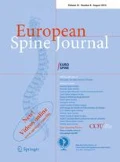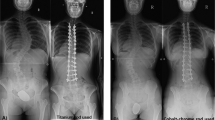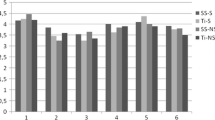Abstract
Purpose
Pedicle screw fixation is considered biomechanically advantageous in adolescent idiopathic scoliosis (AIS) correction, because it uses as an anchor the pedicle, which is the hardest part of the vertebral body. The ability of the rod to correct and hold the correction is a key factor in the selection of rod material. The goal of this study was to compare the results obtained by stainless steel (SS) and cobalt–chromium (CoCr) rods materials for the treatment of AIS curves.
Methods
Ninety patients were retrospectively included. Sixty-four patients (group 1) were operated on using CoCr rods. Twenty-six patients (group 2) were operated on using SS rods. All the patients were treated by the same surgeon using all-pedicle screw constructs.
Results
In group 1, the correction was respectively 41.03° and 35.78° for main and secondary curves. In group 2, the correction was respectively 30.98° and 24.42° for main and secondary curves. Statistical analysis showed improved correction rates in patients operated with CoCr rods for main (P < 0.0001) and secondary (P = 0.0003) curves with a lower loss of correction at final follow-up. Regarding the sagittal profile, postoperative T4T12 thoracic kyphosis was 28.04° in CoCr group compared to 22.79° in SS group (P = 0. 0.0038).
Discussion
The present study confirms the ability of the all-pedicle screw construct to reach the maximum coronal plane correction and prevent deformity progression while maintaining balance. CoCr rods have the ability to exert higher corrective forces on the spine with relatively small amounts of rod deformation. Our findings confirm that CoCr rods have the ability to produce higher correction rates in frontal plane compared to SS rods of the same diameter.

Similar content being viewed by others
References
Hitchon PW, Brenton MD, Black AG, From A, Harrod JS, Barry C, Serhan H, Torner JC (2003) In vitro biomechanical comparison of pedicle screws, sublaminar hooks, and sublaminar cables. J Neurosurg 99:104–109
Kim YJ, Lenke LG, Cho SK, Bridwell KH, Sides B, Blanke K (2004) Comparative analysis of pedicle screw versus hook instrumentation in posterior spinal fusion of adolescent idiopathic scoliosis. Spine (Phila Pa 1976) 29:2040–2048
Karatoprak O, Unay K, Tezer M, Ozturk C, Aydogan M, Mirzanli C (2008) Comparative analysis of pedicle screw versus hybrid instrumentation in adolescent idiopathic scoliosis surgery. Int Orthop 32:523–528 discussion 529
Kim YJ, Lenke LG, Kim J, Bridwell KH, Cho SK, Cheh G, Sides B (2006) Comparative analysis of pedicle screw versus hybrid instrumentation in posterior spinal fusion of adolescent idiopathic scoliosis. Spine (Phila Pa 1976) 31:291–298
Lowenstein JE, Matsumoto H, Vitale MG, Weidenbaum M, Gomez JA, Lee FY, Hyman JE, Roye DP Jr (2007) Coronal and sagittal plane correction in adolescent idiopathic scoliosis: a comparison between all pedicle screw versus hybrid thoracic hook lumbar screw constructs. Spine (Phila Pa 1976) 32:448–452
Sugarman E, Sarwahi V, Amaral T, Wollowick A, Gambassi M, Seimon L (2013) Comparative analysis of perioperative differences between hybrid versus pedicle screw instrumentation in adolescent idiopathic scoliosis. J Spinal Disord Tech 26:161–166
Belmont PJ Jr, Polly DW, Jr, Cunningham BW, Klemme WR (2001) The effects of hook pattern and kyphotic angulation on mechanical strength and apical rod strain in a long-segment posterior construct using a synthetic model. Spine (Phila Pa 1976) 26:627–635
Clements DH, Betz RR, Newton PO, Rohmiller M, Marks MC, Bastrom T (2009) Correlation of scoliosis curve correction with the number and type of fixation anchors. Spine (Phila Pa 1976) 34:2147–2150
Serhan H, Mhatre D, Newton P, Giorgio P, Sturm P (2013) Would CoCr rods provide better correctional forces than stainless steel or titanium for rigid scoliosis curves? J Spinal Disord Tech 26:E70–E74
Wedemeyer M, Parent S, Mahar A, Odell T, Swimmer T, Newton P (2007) Titanium versus stainless steel for anterior spinal fusions: an analysis of rod stress as a predictor of rod breakage during physiologic loading in a bovine model. Spine (Phila Pa 1976) 32:42–48
Abul-Kasim K, Karlsson MK, Ohlin A (2011) A increased rod stiffness improves the degree of deformity correction by segmental pedicle screw fixation in adolescent idiopathic scoliosis. Scoliosis 6:13
Lamartina C, Petruzzi M, Macchia M, Stradiotti P, Zerbi A (2011) A role of rod diameter in comparison between only screws versus hooks and screws in posterior instrumentation of thoracic curve in idiopathic scoliosis. Eur Spine J 20(Suppl 1):S85–S89
Lenke LG, Betz RR, Harms J, Bridwell KH, Clements DH, Lowe TG, Blanke K (2001) Adolescent idiopathic scoliosis: a new classification to determine extent of spinal arthrodesis. J Bone Joint Surg Am 83(A(8)):1169–1181
Asher MA, Lai SM, Carlson BB, Gum JL, Burton DC (2010) Transverse plane pelvic rotation increase (TPPRI) following rotationally corrective instrumentation of adolescent idiopathic scoliosis double curves. Scoliosis 5:18
Shah SA (2007) Derotation of the spine. Neurosurg Clin N Am 18:339–345
Crawford AH, Lykissas MG, Gao X, Eismann E, Anadio J (2013) All-pedicle screw versus hybrid instrumentation in adolescent idiopathic scoliosis surgery: a comparative radiographical study with a minimum 2-year follow-up. Spine (Phila Pa 1976) 38:1199–1208
Cuartas E, Rasouli A, O’Brien M, Shufflebarger HL (2009) Use of all-pedicle-screw constructs in the treatment of adolescent idiopathic scoliosis. J Am Acad Orthop Surg 17:550–561
Quan GM, Gibson MJ (2010) Correction of main thoracic adolescent idiopathic scoliosis using pedicle screw instrumentation: does higher implant density improve correction? Spine (Phila Pa 1976) 35:562–567
Rose PS, Lenke LG, Bridwell KH, Mulconrey DS, Cronen GA, Buchowski JM, Schwend RM, Sides BA (2009) Pedicle screw instrumentation for adult idiopathic scoliosis: an improvement over hook/hybrid fixation. Spine (Phila Pa 1976) 34:852–857 discussion 858
Wang X, Aubin CE, Robitaille I, Labelle H (2012) Biomechanical comparison of alternative densities of pedicle screws for the treatment of adolescent idiopathic scoliosis. Eur Spine J 21:1082–1090. doi:10.1007/s00586-011-2089-7
Hwang SW, Samdani AF, Marks M, Bastrom T, Garg H, Lonner B, Bennett JT, Pahys J, Shah S, Miyanji F, Shufflebarger H, Newton P, Betz R (2013) Five-year clinical and radiographic outcomes using pedicle screw only constructs in the treatment of adolescent idiopathic scoliosis. Eur Spine J 22:1292–1299. doi:10.1007/s00586-012-2625-0
Noshchenko A, Xianfeng Y, Armour GA, Baldini T, Patel VV, Ayers R, Burger E (2011) Evaluation of spinal instrumentation rod bending characteristics for in situ contouring. J Biomed Mater Res B Appl Biomater 98:192–200
Paik H, Kang DG, Lehman RA Jr, Gaume RE, Ambati DV, Dmitriev AE (2013) The biomechanical consequences of rod reduction on pedicle screws: should it be avoided? Spine J 13:1617–1626. pii: S1529-9430(13)00522-6
Noshchenko A, Patel VV, Baldini T, Yun L, Lindley EM, Burger EL (2011) Thermomechanical effects of spine surgery rods composed of different metals and alloys. Spine (Phila Pa 1976) 36:870–878
Isa Majluf M (1991) The use of hydroxyapatite in modern dentistry. Rev Dent Chile 82:30–35
Harnach Z (1958) Inertium-a Czechoslovakian alloy with the properties of vitalium. Acta Chir Orthop Traumatol Cech 25:23–27
Mollowitz G (1966) Vitalium endprosthesis in sarcoma of the proximal humerus. Chirurg 37:130–132
Radulescu A, Stanciulescu P, Voinea A, Robanescu N, Baciu C, Radulescu M (1957) Comparative aspects of biological tolerance of acrylic and vitalium implants. Probl Tuberculoza 7:81–86
Wojnar L (2001) Porosity structure and mechanical properties of vitalium-type alloy for implants. Mater Charact 46:221
Yu CH, Chen PQ, Ma SC, Pan CH (2012) Segmental correction of adolescent idiopathic scoliosis by all-screw fixation method in adolescents and young adults. Minimum 5 years follow-up with SF-36 questionnaire. Scoliosis 7:5
Ernstberger T, Heidrich G (2007) Postfusion magnetic resonance imaging artifacts caused by a titanium, cobalt–chromium–molybdenum, and carbon intervertebral disc spacer. J Spinal Disord Tech 20:154–159
Trammell TR, Flint K, Ramsey CJ (2012) A comparison of MRI and CT imaging clarity of titanium alloy and titanium alloy with cobalt–chromium-alloy pedicle screw and rod implants in the lumbar spine. J Bone Joint Surg Am 94:1479–1483
Scuderi GJ, Greenberg SS, Cohen DS, Latta LL, Eismont FJ (1993) A biomechanical evaluation of magnetic resonance imaging-compatible wire in cervical spine fixation. Spine (Phila Pa 1976) 18:1991–1994
Griffin CD, Buchanan RA, Lemons JE (1983) In vitro electrochemical corrosion study of coupled surgical implant materials. J Biomed Mater Res 17:489–500
Kuraishi S, Takahashi J, Hirabayashi H, Hashidate H, Ogihara N, Mukaiyama K, Kato H (2013) Pedicle morphology using computed tomography-based navigation system in adolescent idiopathic scoliosis. J Spinal Disord Tech 26:22–28
Smorgick Y, Settecerri JJ, Baker KC, Herkowitz H, Fischgrund JS, Zaltz I (2012) Spinal cord position in adolescent idiopathic scoliosis. J Pediatr Orthop 32:500–503
Suk SI, Kim JH, Kim SS, Lim DJ (2012) Pedicle screw instrumentation in adolescent idiopathic scoliosis (AIS). Eur Spine J 21:13–22
Takeshita K, Maruyama T, Sugita S, Oshima Y, Morii J, Chikuda H, Ono T, Nakamura K (2011) Is a right pedicle screw always away from the aorta in scoliosis? Spine (Phila Pa 1976) 36:E1519–E1524
Zhu F, Sun X, Qiao J, Ding Y, Zhang B, Qiu Y (2013) Misplacement pattern of pedicle screws in pediatric patients with spinal deformity: a computed tomography study. J Spinal Disord Tech 5. doi:10.1097/BSD.0b013e31828d6a1b
Di Silvestre M, Parisini P, Lolli F, Bakaloudis G (2007) Complications of thoracic pedicle screws in scoliosis treatment. Spine (Phila Pa 1976) 32:1655–1661
Hicks JM, Singla A, Shen FH, Arlet V (2010) Complications of pedicle screw fixation in scoliosis surgery: a systematic review. Spine (Phila Pa 1976) 35:E465–E470
Kim WJ, Lee SM, Kim JH, Chung ER (2001) Thoracic pedicle screw fixation in spinal deformities: are they really safe? Spine (Phila Pa 1976) 26:2049–2057
Bachy M, Bouyer B, Vialle R (2012) Infections after spinal correction and fusion for spinal deformities in childhood and adolescence. Int Orthop 36:465–469
Liljenqvist U, Lepsien U, Hackenberg L, Niemeyer T, Halm H (2002) Comparative analysis of pedicle screw and hook instrumentation in posterior correction and fusion of idiopathic thoracic scoliosis. Eur Spine J 11:336–343
Ledonio CG, Polly DW Jr, Vitale MG, Wang Q, Richards BS (2011) Pediatric pedicle screws: comparative effectiveness and safety: a systematic literature review from the Scoliosis Research Society and the Pediatric Orthopaedic Society of North America task force. J Bone Joint Surg Am 93:1227–1234
Halm H, Niemeyer T, Link T, Liljenqvist U (2000) Segmental pedicle screw instrumentation in idiopathic thoracolumbar and lumbar scoliosis. Eur Spine J 9:191–197
Min K, Sdzuy C, Farshad M (2013) Posterior correction of thoracic adolescent idiopathic scoliosis with pedicle screw instrumentation: results of 48 patients with minimal 10-year follow-up. Eur Spine J 22:345–354
Conflict of interest
None of the authors has any potential conflict of interest.
Author information
Authors and Affiliations
Corresponding author
Rights and permissions
About this article
Cite this article
Lamerain, M., Bachy, M., Delpont, M. et al. CoCr rods provide better frontal correction of adolescent idiopathic scoliosis treated by all-pedicle screw fixation. Eur Spine J 23, 1190–1196 (2014). https://doi.org/10.1007/s00586-014-3168-3
Received:
Revised:
Accepted:
Published:
Issue Date:
DOI: https://doi.org/10.1007/s00586-014-3168-3




